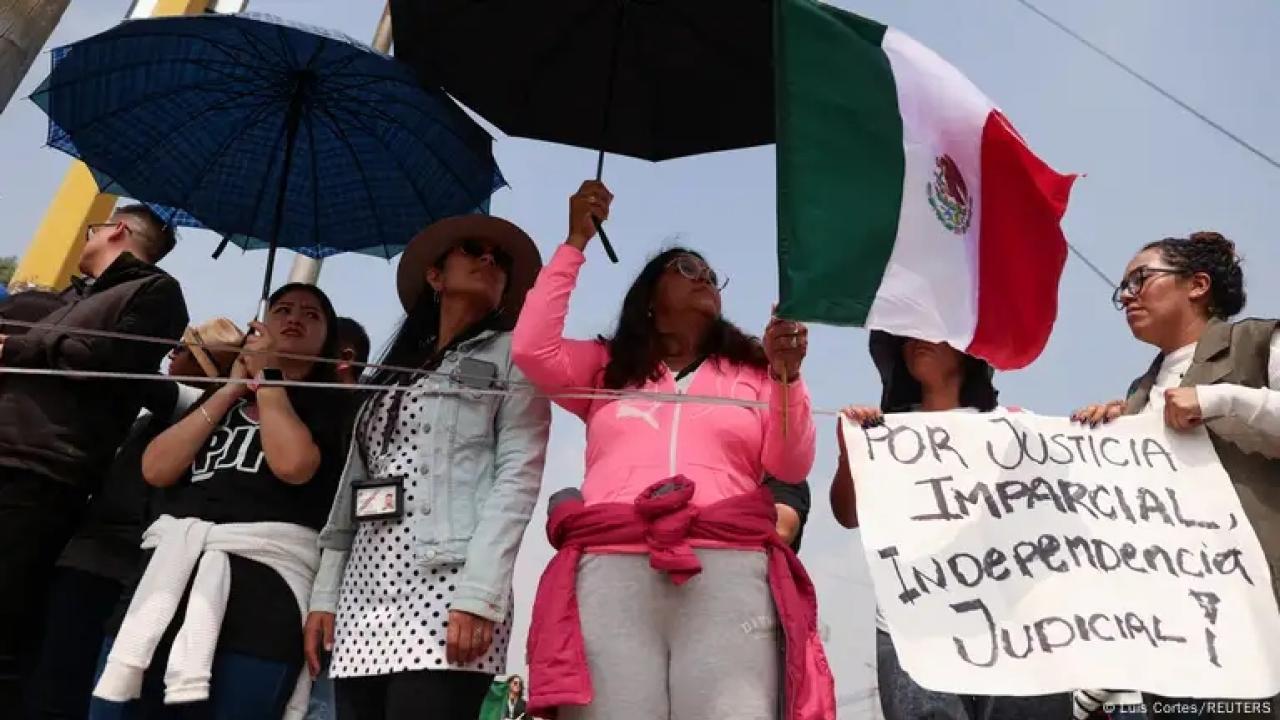
American companies in Mexico have halted investment announcements in the country due to the possible implications of the reforms being processed by Congress to elect judges by popular vote and eliminate autonomous bodies.
"Given the current circumstances, we have decided not to announce the huge planned US investment because we are analyzing the impact on legal certainty regarding judicial reform," confirmed Larry Rubín, president of the American Society of Mexico (Amsoc), to the EFE news agency, in a brief interview, within the framework of the "Third Bilateral Convention: a new shared future," in Mexico City.
Rubin said that these announcements are being reviewed by Amsoc, which represents the interests of American private capital in Mexico, with the help of a group of American experts, although he did not specify investment figures.
The American business leader even mentioned that one of the two presidential candidates in the United States has approached Amsoc to express its "great concern about the impact of such an important reform" on the country's internal politics.
US BUSINESSMEN ASK NOT TO LEGISLATE "IN A RUSH"
Inaugurating the Third Binational Convention, Rubín asked the Mexican Congress not to legislate these reforms "hastily," since he said it could cause damage to the bilateral relationship with the United States and bring economic repercussions for the country.
"It is essential that any reform of this magnitude be carried out with great care, be thoroughly studied, not rush into legislation, and truly involve all stakeholders," he said.
He warned that Americans and Mexicans are not oblivious to the legal and political changes that occur in the internal policies of both countries, while maintaining that these legal changes "are not minor reforms," but rather "vital changes" that affect internal politics and the commercial relationship with its partner in North America.
For this reason, he called on Congress to delay, instead of two or four days, up to six months, if necessary, so that this legislative process is not "rushed" and "develops with the seriousness that a reform of this magnitude demands."
OFFER COLLABORATION AND WARN OF COMMERCIAL REPERCUSSIONS
Rubin said he agreed with the US ambassador to Mexico, Ken Salazar, in supporting judicial reform in the country. However, he also expressed concern about the election of judges by popular vote, which he said might not address problems such as corruption or promote institutional strengthening.
The leader of the American private sector in Mexico pointed out that this is an issue to be discussed at "a crucial moment" for the bilateral relationship with its main commercial partner and in which the revision of the Mexico, United States and Canada Treaty (T-MEC) is included. "That is why we ask Congress to take into consideration the voice of the most important investment in this country, which is the investment of the United States in Mexico."
In this regard, he noted that private capital in the United States wants to participate in "active discussions and help Mexico to have a strengthened rule of law for American companies" in the country.
Regarding the intention to also abolish autonomous bodies, he pointed out that any change that undermines their independence could lead to trade disputes that would affect both economies, as well as the trust built together.
MEXICAN SENATE SEEKS TO QUICKLY APPROVE JUDICIAL REFORM
This call comes as the Senate of Mexico approved, on Tuesday, September 3, to discuss via fast track the constitutional reforms of President Andrés Manuel López Obrador.
The decision, driven by the majority of the ruling party in the upper house of the Mexican Congress, will allow senators to immediately begin discussing the opinion sent by the Chamber of Deputies on the controversial judicial reform - which includes the proposal to elect judges by popular vote - and others, such as the one referring to the disappearance of autonomous bodies, which have generated controversy within the country and abroad.
In addition, the agreements reached will allow senators to carry out their discussion and imminent approval in venues other than the legislative building of the Upper House, located on the main avenues of Paseo de la Reforma and Insurgentes, in Mexico City, in the face of heated protests from the judiciary.
INTERNATIONAL REACTIONS
Previously, the International Chamber of Commerce (ICC) and its Mexican chapter also asked Congress to "act with caution" in the discussion of these reforms, since they could incur violations of international law "and, therefore, possible economic penalties against the country that will have to be paid with the taxes of all Mexican taxpayers."
Judicial reform in Mexico has raised warnings from multilateral organizations, such as the United Nations; business organizations, such as the International Chamber of Commerce; rating agencies, such as Fitch; and entities such as Citibanamex, Stanley Morgan and UBS, among others.
The embassies of the United States and Canada have also expressed concern that it could pose risks to private investment, trade agreements and possible economic sanctions.









